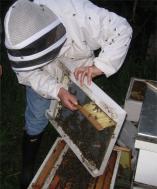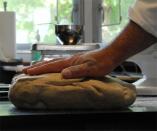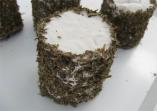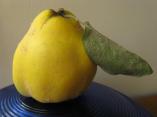When I was in Santa Fe last September, I took a few classes at the Santa Fe School of Cooking to get me oriented to my new surroundings. Mostly demonstration classes, except for a hands-on session on roasting chiles and pressing tortillas, they were a fabulous introduction to the town and the food, and a great way to pass the morning, ending with a gourmet lunch prepared before our eyes.
Our chef was Rocky Durham, who was absolutely wonderful: a passionate travel resource for his home town, a quirky advocate of southwestern cuisine – though marked forever by his classical French training – with a well-travelled palate to draw on, and of course a life-long love of good food. One of the best parts of the class were the dining Q and A: Rocky gave his unadulterated opinion of any local restaurant we cared to ask him about, and both tourists and locals (there were some in all the classes I attended) shared their picks as well. But if you go there… just don’t expect to leave without a bag of chiles and seasonings from the cooking school’s well provisioned gift shop.
Rocky gave us a few enduring tips for the road as well. One very useful one was to invest in a cheap electric coffee grinder, and another was not to buy ground spices, but rather to roast whole ones (cumin, cinnamon, oregano etc) as needed in a dry pan and then grind them in aforementioned grinder. It can be cleaned easily, he said, by whizzing a spoonful of plain white rice or salt or fresh bread crumbs. Works like a damn.
One of my classmates, by a strange coincidence, was an American expat living in London, who works at Divertimenti, a stellar cookware shop that has branched out into cooking classes. Though I still have some of their cookware, I’ve never attended their classes, but I have been to some at a much beloved cookbook shop in Notting Hill’s Portobello Market, Books for Cooks, which were endlessly interesting and delicious as well.
 And now, after a morning canter along the Gorge with old Anton, I must return to a meditation on rhyme. I’m giving a short presentation on rhyme to the form class on Wednesday; so far I have identified 34 kinds of rhyme and around 40 poetry forms that use rhyme (including 5 different sonnet forms). My favourite kind of rhyme so far is Procrustean Rhyme: rhyme on words which have no conventional rhymes. Uses the method Procrustes used on his victims: stretching them if they were too short to fit his bed, and lopping something off if they were too long. So you end up truncating words (enjambing them awkwardly with hyphens) or extending them into phrases.
And now, after a morning canter along the Gorge with old Anton, I must return to a meditation on rhyme. I’m giving a short presentation on rhyme to the form class on Wednesday; so far I have identified 34 kinds of rhyme and around 40 poetry forms that use rhyme (including 5 different sonnet forms). My favourite kind of rhyme so far is Procrustean Rhyme: rhyme on words which have no conventional rhymes. Uses the method Procrustes used on his victims: stretching them if they were too short to fit his bed, and lopping something off if they were too long. So you end up truncating words (enjambing them awkwardly with hyphens) or extending them into phrases.










2 Responses to Some live to travel, others travel to cook